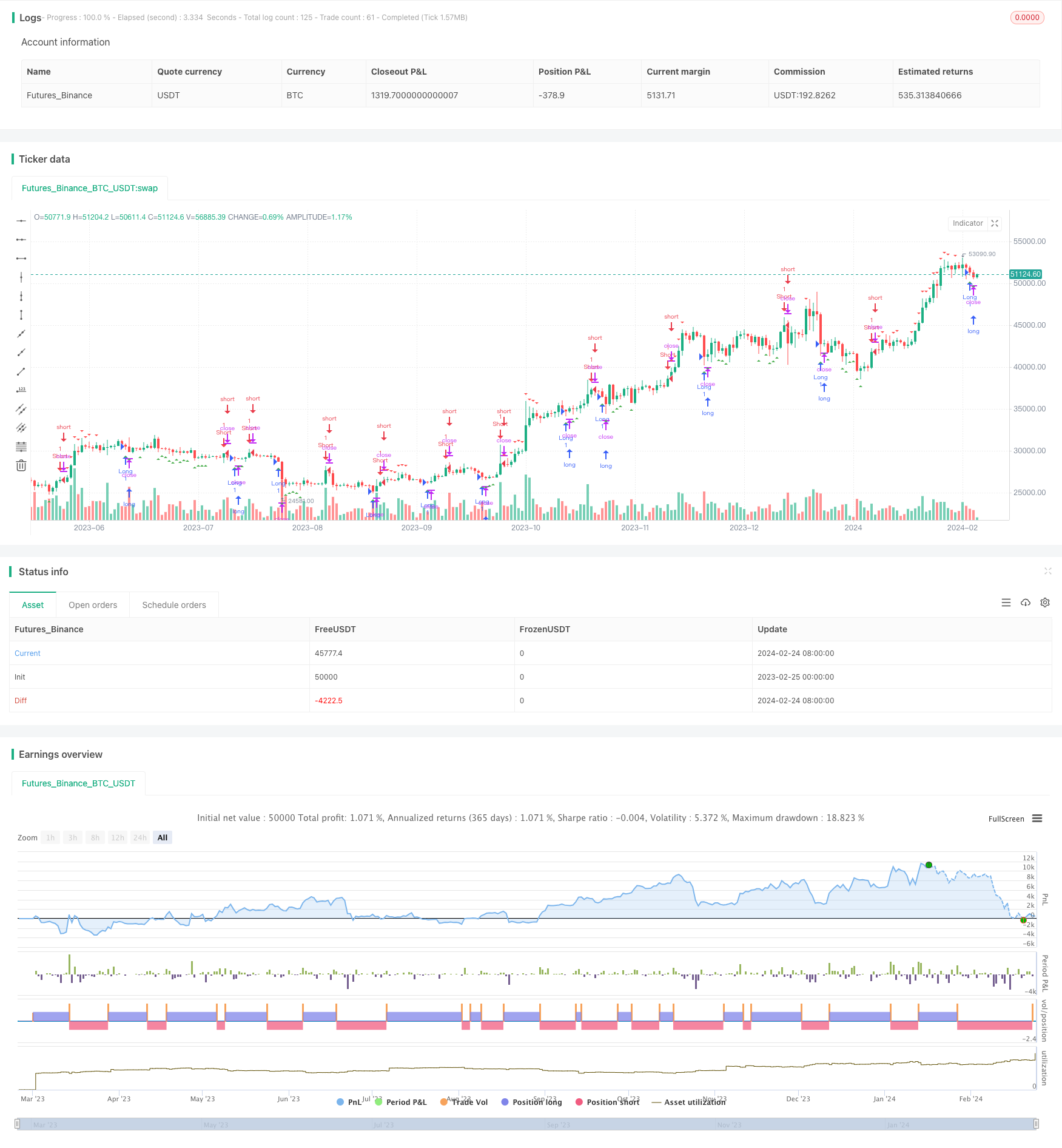
概述
该策略基于两个不同参数设置的超趋势指标和CCI指标,目标是捕捉短线价格波动,实现高频交易。超趋势指标通过动态计算ATR,判断价格的趋势方向;而CCI指标则用于判断市场是否超买超卖。策略结合两者形成交易信号。
策略原理
使用14周期的ATR计算快速超趋势,设置因子为3;使用14周期的ATR计算慢速超趋势,设置因子为6。快速超趋势更敏感,可以捕捉短期变动;慢速超趋势判断主要趋势方向。
当快速超趋势下穿价格,且慢速超趋势还在价格之上时,判断为可能的反转信号,做多;当快速超趋势上穿价格,且慢速超趋势还在价格之下时,判断为可能的反转信号,做空。
同时,利用CCI判断市场超买超卖状况。CCI高于100时市场为超买,低于-100时市场为超卖。结合CCI信号过滤假突破。
在超买超卖情况下,超趋势指标发出反转信号的可能性更大,这是策略的核心逻辑。
优势分析
结合超趋势判断趋势反转点和CCI判断超买超卖状况,可以有效过滤假突破,提高信号质量。
快慢超趋势交叉形成交易信号,实现高频出入场。
CCI参数和超趋势的参数可以灵活调整,适应不同市场状况。
策略思路清晰易理解,参数调整也较为简单。
风险及解决方法
超趋势本身存在时滞,可能错过首次反转机会。可以试验缩短ATR周期。
CCI存在回调风险,波动过大也可能造成重复交易。可以试验增大CCI的参数或调整边界。
高频交易容易增加交易频次和手续费负担。建议调整持仓时间,降低开平仓频率。
优化思路
可以基于最大回撤或盈亏比等指标对参数组合进行遍历优化,寻找最优参数。
可以结合机器学习方法如随机森林针对参数进行特征选择,实现参数的自动优化。
可以探索在特定周期内限制最多开仓次数,来控制风险。
总结
该策略充分利用超趋势指标判断短期趋势反转点,辅以CCI指标过滤信号。参数设置合理时,可以实现高效率的短线交易。但也需要警惕过于频繁交易带来的各类风险,通过参数调整及算法优化不断改进,能够获得更好的策略表现。
/*backtest
start: 2023-02-25 00:00:00
end: 2024-02-25 00:00:00
period: 1d
basePeriod: 1h
exchanges: [{"eid":"Futures_Binance","currency":"BTC_USDT"}]
*/
//@version=5
strategy(title="Stochastic RSI Strategy", shorttitle="StochRSI", overlay=true)
rsiLength = input.int(14, title="RSI Length")
stochLength = input.int(14, title="Stochastic Length")
kSmooth = input.int(3, title="K Smooth")
dSmooth = input.int(3, title="D Smooth")
oversoldLevel = input(10, title="Oversold Level")
overboughtLevel = input(90, title="Overbought Level")
rsi = ta.rsi(close, rsiLength)
stochRsi = ta.stoch(rsi, rsi, rsi, stochLength)
longCondition = stochRsi < oversoldLevel
shortCondition = stochRsi > overboughtLevel
if (longCondition)
strategy.entry("Long", strategy.long)
if (shortCondition)
strategy.entry("Short", strategy.short)
if (shortCondition)
strategy.close("Long")
if (longCondition)
strategy.close("Short")
plotshape(longCondition, style=shape.triangleup, location=location.belowbar, color=color.green, size=size.small)
plotshape(shortCondition, style=shape.triangledown, location=location.abovebar, color=color.red, size=size.small)